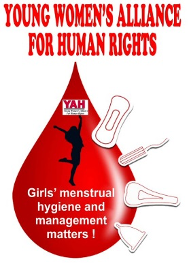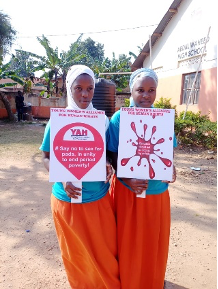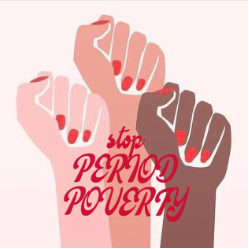Breaking Period Poverty and Menstrual Shame for Girls in Uganda
By Nankwanga Eunice Kasirye
Offensive traditional myths about Menstrual Health and Hygiene, personal privacy violations, psychological and social torture curved out of limited, distorted or complete lack of information alongside worsening poverty levels and stigma on menstruation are major barriers that characterise period inequality in Uganda.
Period equity is yet to attract the attention of different actors in Uganda yet a number of girls and women barely have enough information, education and accessibility to safe menstrual products worsening the existing societal and institutionalised inequalities against them.
A multi-stakeholder approach where the media takes the central role to integrate Menstrual Health and Hygiene Management information and education through media reports content and debates would go a long way to create public awareness and sensitization.

Young Women’s Alliance for Human Rights –YAH recommends deliberate efforts to prioritise Menstrual Health & Hygiene Management at the sector level as well as enhancing the knowledge capacity of the media to create informed discussions that could trigger policy formulations and resource allocation.
A cross-section of girls from poverty-stricken families use plant leaves as sanitary pads in Uganda…. some use old rugs that require routine washing for reuse yet soap and water are scarce. Some cultures taint menstruation as a taboo forcing girls into isolation during periods for they are deemed unclean… lest a curse befalls her and their relatives.
Sex for pads is a common habit among some girls from urban poor communities-the habit does not only expose the girls to early pregnancy but also exposes them to deadly Sexually transmitted diseases such as HIV/AIDS not forgetting school dropout.
Menstruation is regarded as a qualification for marriage in some communities where girls are majorly treated as trade commodities for families, therefore upon the first occurrence of menstruation periods, the girls are sold off into marriage in exchange for money and items such as domestic birds and animals.
One in every four girls between the age of 12 and 18 years in Uganda will drop out of school once they begin menstruating, and school absence rates triple from 7% to 28% during their period – Ministry of Education Performance Monitoring & Accountability Report,2020
Some of the menstruation-age girls from families so poor to afford decent sanitary pads offer sex to men in exchange for sanitary pads every month. Decent sanitary pads are a luxury expense for an ordinary family in Uganda with the majority barely able to afford basic life needs beyond one meal a day.
Menstrual periods are an inevitable experience for any girl/woman within the reproductive age range. The Periods-start-age varies from one girl to another but it is often between the age of 9 years to 59. The experience comes with a lot of challenges of which bleeding is a constant and the intensity of flow is also relative, with some girls and women experiencing heavy flow or less.

The monthly blood flow requires special attention for a girl or a woman to comfortably sustain routine chores otherwise one would end up in isolation and drenched self-esteem out of embarrassment. To live above the pangs of menstruation, girls and women ought to have access to well-structured Menstruation Period Management services that would translate into readily available decent sanitary pads, wash facilities, convenient changing spaces, and psychological, social and medical support.
Unfortunately, the aforementioned facilities are generally scarce even for other occasional incidences since they come with a cost yet girls and women are already classified among the most vulnerable poor groups with limited access to money and other resources.
Like other inequalities that got exacerbated by the outbreak of COVID-19, the already frail Menstrual Hygiene Management experienced a steep deterioration with a lack of access to basic items like descent disposable pads pushing most girls into more vulnerable positions to afford relatively decent periods.
The Young Women’s Alliance for Human Rights –YAH in collaboration with the Human Rights Institute East Africa and TIPEN spearheaded the implementation of the one-year project code-named Breaking Period Poverty and Menstrual Shame for Girls in the post COVID-19 Pandemic with the ambition to increase focus on effective Menstrual Health & Hygiene Management and support for girls post the COVID19 lockdown in Uganda
Through experience sharing sessions with a cross-section of both school-going and out-of-school teenage girls in selected schools in Wakiso and Kampala districts, peer-to-peer guidance and holding of a multisector dialogue with different actors, a situation analysis handbook that lays down experiences, challenges, lessons and recommendations for Menstrual Healthy Management was produced.
A good number of girls interviewed reported having gotten involved in sex with different boyfriends in search of money for pads and one of them got pregnant and attempted to carry out an abortion without professional medical guidance which almost cost her life.
Some girls reported that they opt to ask money for pads from boyfriends because they are well aware that their parents/caretakers can barely afford basic life needs therefore pads’ cost could only be an extra expense pressure. 60% of the 440 girls interviewed reported that their parents cannot afford money for pads and 40% indicated that they secure money for pads from boyfriends.
Girls’ dignity and confidence is adversely bruised during menstruation because communities and schools don’t have clear support systems such as private pad disposal facilities, changing and washing areas as well counselling and guidance services. The girls that use the old cloth rugs for pads find it hard to stay at school since they feel soaked and unclean making it uncomfortable to attend school. Some schools do not have Senior Women Teachers to take girls through Menstrual Health Management experiences while other schools have male teachers to execute the duties of a Senior Woman teacher.
To accelerate Period equity, the Young Women’s Alliance –YAH further recommends an all-inclusive approach that involves boys and men in the promotion of Menstrual Health and Hygiene Management alongside aggressive media campaigns for attitude and perception change to break the cultural barriers against effective and efficient period management.








